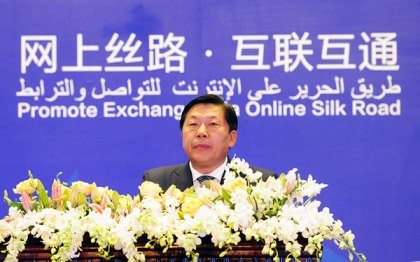State leaders, government officials and corporate executives from China and Middle East countries gathered on Thursday, Sept. 10, to attend a four-day expo in northwest China's Ningxia Hui Autonomous Region, which is aimed to explore cooperation opportunities, the Xinhua News Agency reported.
A platform to promote ties between China and Middle East countries, the second China-Arab States Expo is held this year in Yinchuan, capital of Ningxia, home to more than 10 percent of China's 20 million Muslims, the report said.
Trade fairs and seminars on e-commerce, new energy, agriculture, education, tourism and medical care will be held during the four-day event, as domestic and foreign participants are expected to share ideas and enter into deals.
In a letter of congratulations, President Xi Jinping said that the exposition has great significance in promoting Sino-Arab exchanges, strengthen friendship and boost cooperation.
"China and the Arab states are good friends with mutual trust, as well as good partners in seeking common prosperity," Xi said, noting that the Arab states have been reacting positively to the Belt and Road Initiative.
"China will uphold the Silk Road Spirit, as well as learn and cooperate in a peaceful, open and inclusive manner [...] with the Arab states," the president added.
During the opening ceremony, State Councilor and Minister of Public Security Guo Shengkun urged China and the Arab states to strengthen political trust, continue to open up markets and ease up two-way trade and investment.
Guo said that China will encourage enterprises and financial institutions to collaborate in building railways, highways, ports, electricity and telecommunications infrastructure in Arabian countries. He ensured that economic development in the Muslim regions will have the support of the Silk Road Fund and the Asian Infrastructure Investment Bank.
The state councilor also called for more cultural and people-to-people exchanges between the two civilizations.
Among the foreign leaders who attended the opening ceremony included Jordanian King Abdullah II Bin Al-Hussein and Mauritanian President Mohamed Ould Abdel Aziz. Jordan is the guest country of honor for this year's expo.
On Wednesday, Sept. 9, President Xi and the Jordanian king signed a joint statement in Beijing seeking a strategic partnership between the two countries.
According to the statement, the partnership is expected to boost cooperation in energy, finance, trade, investment, industrial capacity, infrastructure and law enforcement, among other sectors, as well as boost cultural, educational and military-to-military exchanges.
On the other hand, King Abdullah said that his country values its friendship with China and expressed readiness to boost cooperation with China for the mutual development and prosperity of the two countries.
Trade between China and the Arab states increased from $10 million in 1950s to $251.2 billion in 2014, making China the second largest trade partner of the Arab states. The Middle East countries expect to increase trade volume to $600 billion in the next 10 years.
Arabian students in China have also increased by 11.7 percent in 2014 to 14,000 people, the report said.
The Ministry of Commerce, the China Council for the Promotion of International Trade, and the government of Ningxia sponsored the biennial China-Arab States Expo.



























